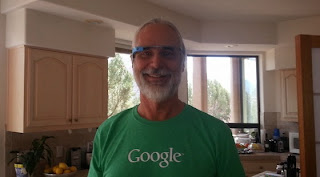I finally tried Google Glasses
Originally published February 15, 2014
I never had the chance to try Google Glasses while I consulted at Google last year but my friend Judy just got a pair and I tried them this morning. Judy took the following picture of me wearing her glasses:
I was pleasantly surprised at how nice they were (after a couple of minutes getting them adjusted). I think that when Google finalizes the product and starts shipping them at a reduced price that the glasses will be popular for a variety of applications like:
- Workers who need to keep their hands free
- People with disabilities
- Walking tours, supplying information about what a person is looking at
- Hands free web search
- Hands free photography and videography (but, the Google Glasses need an indicator light warning people when the camera is on!)
- etc., etc.
Long term, wearable mobile devices will probably be very important to Google's business. This is just a guess, but: I expect Google Now (in some form) to eventually become the primary way that users access Google's various services and not only will Google Now be highly adaptable to individuals, but there will likely be different flavors for peoples' individual contexts like what kind of job they have and whether they are at work or at play. The big question I have is what the monetization strategy will be. It is difficult to accept that advertisements will be appreciated by users in voice interactions with mobile devices. It is true that the data Google gets from services like Google Now, on device GPS, etc. obviously helps target advertisements.
The other question I have (and only waiting a few years will answer my question) is: how is Apple going to compete? As a very happy owner of a MacBook Air and an iPad, I love Apple gear, and Google Now services run great on my iPad (and I assume also on iPhones) so Google probably does not care too much if people use iPhones or Android phones to access Google Now services. However it seems to me that Apple is leaving a lot on the table if they only go after the hardware and operating system market. I find using Siri on my iPad a nice experience but Apple does not have the same level of detailed information about me to compete with Google Now. It may be a bit of a stretch but I wouldn't be surprised if Apple ends up owning the market for people who want to maintain more privacy and Google will own the market of people willing to let Google have every bit of information about them in order to make money and provide services. Part of me would rather be in the "privacy consumer market" if Apple steps up and builds an ecosystem that protects people's privacy, and they could do this because they can make money without knowing a lot of personal details about people who use their gear. Google does not have that flexibility.


Comments
Post a Comment